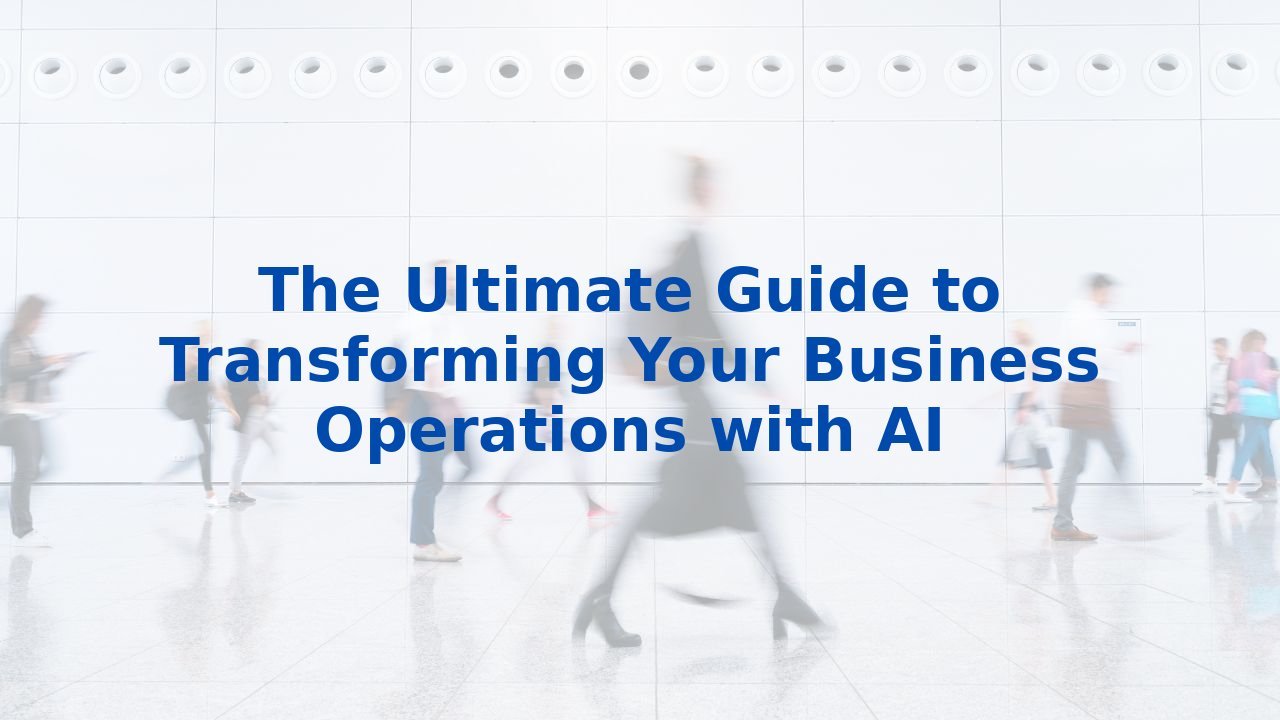The Ultimate Guide to Transforming Your Business Operations with AI
The Ultimate Guide to Transforming Your Business Operations with AI
Introduction
In today’s hyper-connected world, businesses must adapt to an ever-evolving landscape. Enter artificial intelligence (AI)—not just a buzzword, but a powerful tool that can redefine operational efficiency. From streamlining processes in finance to enhancing customer interactions in retail, the potential of AI to revolutionize business operations cannot be overstated. This guide will illuminate how AI can enhance various business processes while underscoring the tremendous benefits it brings to organizational efficiency.
Task Automation
One of the most notable impacts of AI lies in task automation. Imagine a world where repetitive tasks such as data entry, customer inquiries, and appointment scheduling are handled seamlessly. By leveraging AI-powered software for these tasks, organizations can slash operational costs and drastically increase productivity. Automation allows employees to pivot from mundane activities to higher-order work that fosters creativity and strategic thinking. This not only maximizes productivity but also amplifies employee satisfaction as they engage in work that truly matters.
Insightful Data Analysis
Information is power, but only if you can harness it effectively. AI’s ability to process vast swathes of data at lightning speed translates into unmatched analytical prowess. Businesses can gain real-time insights that drive decision-making and strategic planning. In sectors like finance, using AI algorithms enables firms to detect fraudulent activities and predict market trends. This empowers organizations to remain agile and competitive in a landscape where every data-driven decision can mean the difference between success and stagnation.
Augmentation of Human Capabilities
AI’s impact is not merely about automation; it’s about augmentation. By taking charge of routine tasks, AI allows human beings to channel their energy into initiatives demanding a creative touch and strategic foresight. This shift transforms management and encourages teams to focus on innovations, setting the stage for nimble operational frameworks. Embracing AI, companies can unleash human potential like never before, significantly improving both productivity and engagement.
Enhancing Customer Experience
In the age of instant gratification, customer experience can make or break a business. With AI-driven tools like chatbots and personalized recommendation engines, organizations are transforming the way they interact with customers. AI’s capabilities don’t just optimize these interactions; they create meaningful, tailored experiences that foster customer loyalty. When clients feel understood—with personalized products and immediate support—they are far more likely to engage and return. Enhancing customer experiences is no longer just a strategy; it’s a necessity.
Improving Accuracy and Reducing Errors
Errors can be costly. AI mitigates this risk by increasing the accuracy of critical business processes. By harnessing sophisticated algorithms and predictive analytics, businesses can sift through immense datasets and surface actionable insights that might be missed by human analysis. Sectors like finance benefit immensely from AI’s ability to crutch data interpretation, ensuring data-driven decisions are based on solid foundations rather than guesswork.
The Future of Work: How Will AI Change Business?
The question is no longer whether AI will change how businesses operate but rather how it will shape the future of work. The prospects are exciting: a world with streamlined operations, enriched customer experiences, and enhanced employee capabilities. However, this transition isn’t without challenges. Businesses need to tread thoughtfully, addressing potential pitfalls such as over-reliance on technology and the imperative for continuous training to integrate AI effectively.
The Importance of Training Employees for AI
As businesses navigate their AI journey, employee training becomes pivotal. Equipping teams with the knowledge to work alongside AI systems can elevate organizational effectiveness. Training shouldn’t just be about utilizing AI tools; it should focus on interpreting insights and integrating AI-driven recommendations into everyday decision-making. Designing comprehensive training programs ensures that employees can harness AI's full potential while understanding its limitations. By investing in human capital, businesses can create an ecosystem where technology and talent coalesce, maximizing the transformative impact of AI.
Conclusion
In summary, the future of business operations is intertwined with the advancements in AI technology. From automating trivial tasks to nurturing richer customer experiences, AI offers an array of benefits that can skyrocket organizational efficiency. By embracing AI and committing to training employees properly, companies can stay ahead of the curve in a continually shifting business landscape. As we look to the future, one thing is clear: the transformative power of AI is just beginning to unfold, heralding an era of unparalleled operational excellence.



